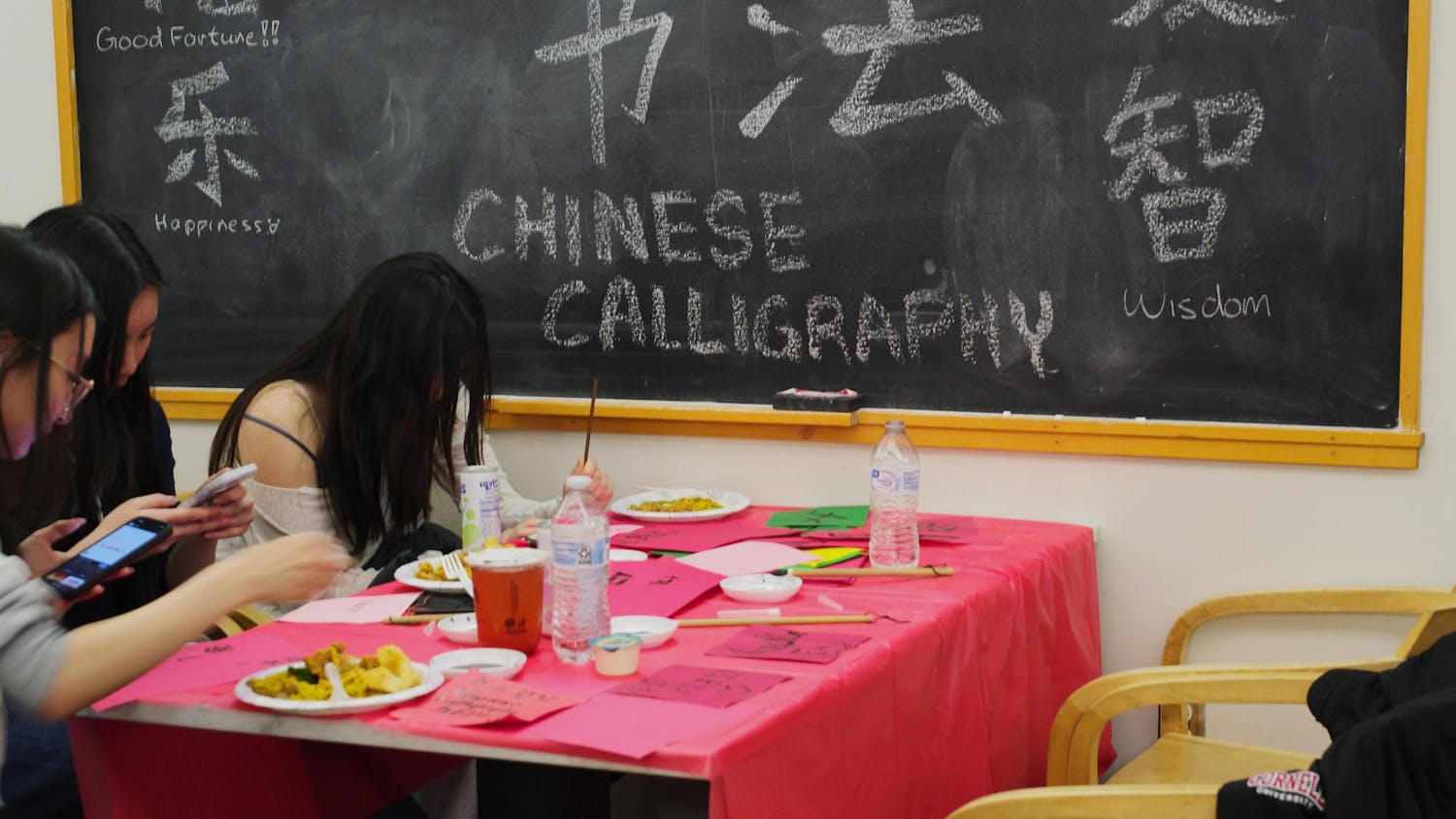The Coalition for Mutual Liberation has issued an ultimatum. The pro-Palestine organization will continue to violate the controversial Interim Expressive Activity Policy unless the Board of Trustees agrees to consider voting on divestment from arms manufacturers providing Israel’s military with weaponry.
CML, an umbrella organization that encompasses over 40 organizations from Cornell and the larger community, hosted a campus-wide protest advertised as a “walk out to fight for divestment.” Held on Thursday, March 14, the demonstration’s timing aligned with Cornell Giving Day, an annual one-day fundraising event that contributes to the University's To Do the Greatest Good campaign.
Approximately 200 student protestors chanted phrases including “Any person, any study, Cornell Trustees’ hands are bloody” and “From the river to the sea, Palestine will be free.” Protestors argued that Cornell’s actions do not reflect the University’s mission “to do the greatest good.”
A speaker in Duffield stated, “We will continue to violate the Student Code of Conduct. We will continue to violate the interim policy. We will continue to disrupt, we will continue to make noise. … We will continue to do all of these things until [President] Martha [Pollack] agrees to call for a vote on divestment at the Board of Trustees meeting on March 22.”
Protestors distributed a flier urging Pollack to call for the trustees to vote on divesting the University’s endowment from ten weapons manufacturers, including Boeing and Lockheed Martin, and “any companies directly complicit in the genocide in Gaza.”
The flier also emphasized the Board of Trustee’s 2016 Standard Guide to Divestment, which established that “the board will consider divesting its endowment assets from a company only when the company’s actions or inactions are ‘morally reprehensible,’ constituting apartheid, genocide, human trafficking, slavery or systemic cruelty to children, including violation of child labor laws.”
Israel has strongly denied allegations that it is committing genocide in Gaza. The International Court of Justice, which called the charge of genocide against Israel “plausible,” has issued an interim ruling that the country must work to prevent activity in Gaza that violates the policies of the 1948 Genocide Convention.
The Student Assembly previously rejected a resolution calling upon the Cornell Board of Trustees to divest from companies “complicit in committing morally reprehensible actions” in Gaza.
Without a resolution from a Cornell assembly or the Faculty Senate, the Board of Trustees Executive Committee, with guidance from the Investment Committee and the president, decides whether divestment criteria are satisfied and then advocates to the full board whether to divest, according to a February 2016 University press release. The full board then makes the final decision to approve divestment.
In a statement to The Sun, CML justified the decision to continue violating the interim policy until the board vows to consider divestment at its March 21-22 meeting.
“Cornell is complicit in genocide, and President Pollack has a moral duty to call a vote on divestment at the upcoming Board of Trustees meeting,” the CML statement to The Sun read. “Only the board has the authority to make a binding decision regarding divestment.”
Enacted on Jan. 24, the interim policy added restrictions on expressive activity, including measures against carrying sticks and poles in protests and limited hours for amplified sound. After receiving extensive criticism from faculty and students, the University lessened the Interim Expressive Activity Policy regulations on event registration, the use of open flames and postering on March 11.
However, CML asserted that “the recent adjustments to the interim policy fundamentally change nothing, and are a lackluster response to widespread outrage over the original policy.”
“None of the policies enforced against student organizers to date have been altered,” the CML statement to The Sun read, referring to policies including restrictions on amplified sound and the use of picket signs.
A representative of Cornell Media Relations did not confirm or deny the possibility that the Board of Trustees would consider voting on the divestment of the University’s endowment when asked by The Sun.
CML did not respond to a request for comment on plans for protests throughout the upcoming Board of Trustees meeting.
Unlike after CML-affiliated protests on Feb. 8, Feb. 22 and March 6, no University statements were released following the Thursday protest to indicate that student protestors were referred for disciplinary action.
The representative of Cornell Media Relations did not explicitly confirm or deny whether students were referred for disciplinary action due to the Thursday protest when asked by The Sun but noted that “referrals to Office of Student Conduct and Community Standards are made when expressive activity violates University policies.”
However, an Instagram statement from CML released on Monday described hostile police intervention at the Thursday protest.
“At Mann [Library], the police blocked us from entering, shoving and intimidating protestors, and locking some into the library even after we had agreed to leave,” the statement read. “The police continued trying to engage with our protestors, insisting that our rally had gone on long enough and demanding that we end our disruptions.”
Some students have expressed discontentment with protests’ academic disruption and discomfort with the repetition of phrases like “From the river to the sea, Palestine will be free.”
Harris Cohen ’27, an active member of Cornell Hillel and Cornellians for Israel, reported an altercation to police officers regarding protestors in Statler Library on Thursday.
“All of a sudden two students in masks with red tape over them ran in and started throwing flyers everywhere, and then one of them came up to me … and put one right in my face, and then screamed, ‘This is all your fault,’” Cohen said.
While Cohen said he was discussing Jewish subjects on the phone, he believes the protestors did not hear him and that the confrontation was not specifically out of bias toward him being Jewish. Cohen also noted that he was unsure whether the statement “This is all your fault,” referred to him or Cornell in general.
However, Cohen said he was distressed at the situation regardless. Upon the arrival of about 150 chanting protestors into Statler Hall, Cohen said he had trouble leaving the building and had to push his way out.
“Regardless of if I was a Jewish student or not, going up to somebody and pushing something in their face and screaming is not what is appropriate in an educational environment like this,” Cohen said.
Cohen said he has heard of other Jewish students encountering negative experiences with protestors.
“I have heard of a bunch of Jewish students just sort of being accosted by some protesters,” Cohen said. “They're just trying to mind their own business. They're not trying to interfere with the right to protest. It's upsetting.”
In a statement to The Sun, CML condemned the protestors’ actions.
“CML condemns all forms of antisemitism,” the CML statement read. “Our actions have always been and will continue to be peaceful and non-violent. The actions of this individual do not reflect — or speak on — our values.”
A representative of Cornell Media Relations also emphasized that “threats and harassment have no place at Cornell” and that students should report such situations to the Office of Institutional Equity and Title IX, OSCCS or Cornell Police.
Cohen said that protestors should “be a little bit more conscious that people have friends and family who are in Israel who have been affected by the heinous crimes of Hamas.” Cohen has many friends in Israel, some of whom are enlisted in the Israel Defense Forces, and spent his winter break on a service mission in Israel where he talked to and cooked for soldiers.
“Just be cautious that in a way you seem from our perspective to be agreeing with [Hamas],” Cohen said regarding the pro-Palestine protestors. “So making that distinction is very important on our part because we feel that it's not being made clear whether you're plainly supporting the right for Palestinian people to their homeland, or for Hamas to continue in their efforts to take out Israel.”

Julia Senzon is a member of the Class of 2026 in the College of Agriculture and Life Sciences. She is the editor-in-chief of the 143rd Editorial Board and was the managing editor of the 142nd Editorial Board. She can be reached at jsenzon@cornellsun.com or 908-672-3047.











